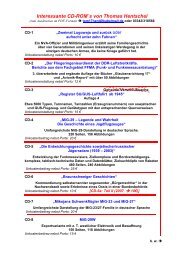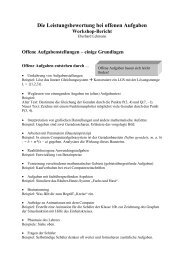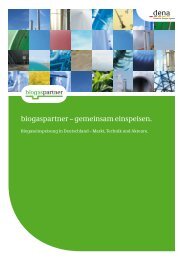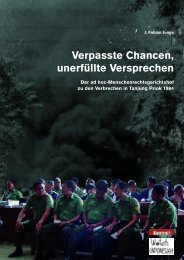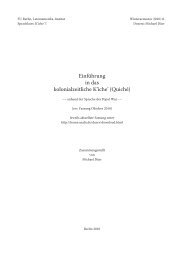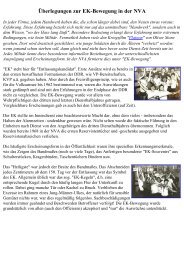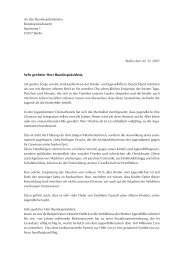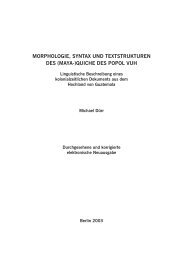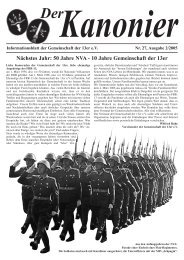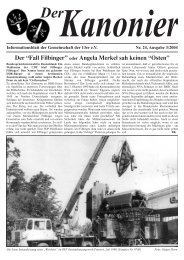SHADOW BOXING: INDONESIAN WRITERS ... - home . snafu . de
SHADOW BOXING: INDONESIAN WRITERS ... - home . snafu . de
SHADOW BOXING: INDONESIAN WRITERS ... - home . snafu . de
Create successful ePaper yourself
Turn your PDF publications into a flip-book with our unique Google optimized e-Paper software.
178 Marshall Clark<br />
Whani's biting <strong>de</strong>nouement to the story, in which small ogre-tusks appear to<br />
emerge from the corners of Sinta's mouth, suggests that our so-called heroine is not<br />
only in cahoots with Rahwana, but has even become a female version of her ogre-lover.<br />
If Sinta were to be treated as a metaphor for the Indonesian nation and its people, as<br />
she so often is, 85 one could argue that Sinta's marriage-of-convenience with Rahwana<br />
represents what has been termed the New Or<strong>de</strong>r "social contract/ 7 As a consequence<br />
of Indonesia's high levels of economic growth during the first few <strong>de</strong>ca<strong>de</strong>s of Suharto's<br />
regime, an unspoken "social contract" came into being, whereby the upper and middle<br />
classes ce<strong>de</strong>d their political rights in exchange for social or<strong>de</strong>r and the opportunity to<br />
pursue their dreams of upward economic mobility relatively unhin<strong>de</strong>red. 86 Using<br />
Darmawan's story as a metaphor for the societal tensions of the Indonesian nation, in<br />
effect what we can see is that Sinta, a representation of the increasingly prosperous<br />
middle classes, is co-opted by Rahwana, who can be consi<strong>de</strong>red as a representation of<br />
the New Or<strong>de</strong>r regime. The next two stories to be discussed also use the Ramayana as<br />
a basis for satirical comment, with even more emphasis on the link between Rahwana<br />
and the New Or<strong>de</strong>r.<br />
Pipit Rochijat's "Presi<strong>de</strong>nt Dosomuko": a Parody of Suharto<br />
Pipit R. K, or Pipit Rochijat Kartawidjaja, is an Indonesian writer, emigre and<br />
activist based in West Berlin. 87 This discussion will be based on the first story of<br />
Pipit's one and only literary publication, a collection of brilliantly satirical wayang<br />
parodies entitled Baratayuda di Negeri Antah Berantah (The Baratayuda in Never-Never<br />
Land) (1993), which was first written in the early 1980s. 88 With the exception of an<br />
unpublished paper by Amrih Widodo, as far as I am aware until now Pipit's extremely<br />
humorous collection appears to have failed to attract any major scholarly attention. 89<br />
One explanation for this is that in an artistic or literary sense Pipit's stories are little<br />
more than seditious parody. Another explanation for the lack of critical attention<br />
could be that when compared to the richness of the wayang's theatrical effect in<br />
performance, the presentation of plot, action, and characterization through written<br />
words alone may seem to be but a pale imitation of the real thing. According to Amrih,<br />
In writing these stories, the author does not seem to think about wayang<br />
performance—the night long presentations accompanied by the gamelan<br />
ensemble. Gamelan—the Javanese music orchestra—is never mentioned. There is<br />
85 See earlier comments in this article, as well as A. S. Laksana's short story, "Air Mata Dewi Shinta," in<br />
Podium Detik (Yogyakarta: Sipress, 1995), pp. 49-52.<br />
86 See Edward Aspinall, Gerry van Klinken, and Herb Feith, "Introduction," The Last Days of Presi<strong>de</strong>nt<br />
Suharto, ed. Edward Aspinall, Herb Feith and Gerry van Klinken (Clayton: Monash Asia Institute, 1999),<br />
pp. ii-iii.<br />
87 For more on the colorful background to Pipit, see Pipit Rochijat, "Am IPKI or Non-PKI?" (translated<br />
with an Afterword by Benedict An<strong>de</strong>rson), Indonesia 40 (1985): 37-56.<br />
88 Pipit Rochijat, Baratayuda di Negeri Antah Berantah.<br />
89 See Amrih Widodo, "'Wayang' Revisited: The Politics of Language of a New Or<strong>de</strong>r Stu<strong>de</strong>nt,"<br />
(unpublished manuscript, 1988), pp. 1-27. Pipit and his writing is briefly discussed in Benedict An<strong>de</strong>rson,<br />
The Spectre of Comparisons: Nationalism, Southeast Asia and the World (London and New York: Verso,<br />
1998), pp. 293-295.


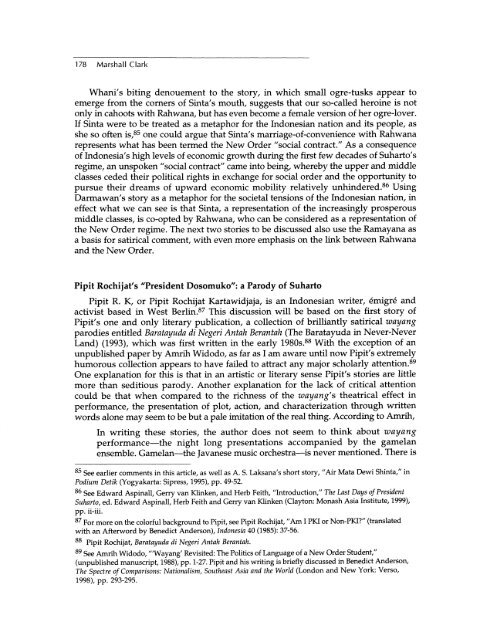
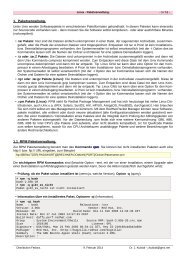
![Parameterdarstellungen [ x(t), y(t) ] Eberhard ... - home . snafu . de](https://img.yumpu.com/22517728/1/184x260/parameterdarstellungen-xt-yt-eberhard-home-snafu-de.jpg?quality=85)
